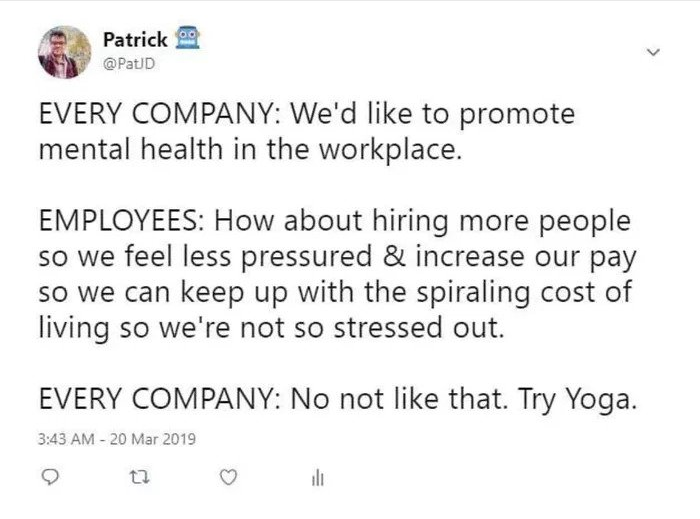Burnout and the Mindfulness Backlash

By Mo Edjlali, Mindful Leader's President and Chief Community Organizer
A couple of years ago I was invited as a guest to attend a Corporate HR Executive event on Resilience in the workplace. As the event went along, sometime towards the middle of the day during a Q&A period one of the attendees stood up and asked a question of the panel that left an impression on me (I’m paraphrasing)
“We are overworked, our employees are overworked, how can we keep increasing people’s workload and just offer a resiliency program? How does that really fix anything?”
And some of you might remember the article we published back in March 8MM+ watched Meditation won’t fix Burnout, its about Moral Injury. This is a trend we have been watching closely, more specifically burnout/ capitalism / and the perception of mindfulness programs in the workplace.
While burnout has been seen as a problem in our fast-paced society, it hasn’t been seen as a legitimate medical condition until now. In late May The World Health Organization (WHO) classified burnout as “a syndrome conceptualized as resulting from chronic workplace stress that has not been successfully managed.” WHO’s classification also declares burnout is specific to occupation and “should not be applied to describe experiences in other areas of life.”
Programs that teach yoga, meditation, and other mind-body practices that have been shown to reduce stress and improve performance. With the attention on burnout, it would seem there is an opportunity to justify the introduction or expansion of the type of programs many of us believe in. However, we are seeing a trend continuing to grow and emerge offering deep criticism against these type of programs with anger, resentment, and frustration.
On April 4th user Lanhdanan shared the following image on Imgur:

It generated 107,081 views and 362 comments as of the writing of this article.
Below are some comments that stood out. The responses to the post not only echoed his cynicism but provided a clear snapshot of burnout and how it is eroding our health and well-being.
“Or try being open and honest about your mental health issues with your boss to have her basically tell you to suck it up. Good times…”
“Or bring in a ping-pong table that no one has time to play on.”
“My boss installed a quiet zen room. Where if you’re stressed you can remove yourself from the mayhem and fail quietly without any help.”
“yup, empty words to tell your employees to take de-stressing measures when you deny the reason they’re stressed at all is how you treat them”
This is not only occurring online. A few weeks ago one of the folks in the Mindful Leader community shared this with me over email:
“...let me tell you about an experience I had recently. I did a session on workplace mindfulness at a national conference last month. Interestingly, one attendee expressed discomfort with my sharing research and perspective from the corporate/private sector, suggesting I was promoting mindfulness as a way to help people survive within exploitative capitalist systems, rather than helping people wake up to and change the reality of their subjugation”
Many of us have personally experienced the deep benefits of Mindfulness and know the potential that these practices have on helping us individually and collectively thrive and reach our fullest potential. I personally believe we are in a very dangerous place in the history of humanity and that Mindfulness can play a critical role in supporting us through it.
By listening, openly engaging, and evolving, our movement can overcome the backlash and other challenges ahead. We must embrace the criticism and work with it, not try to diminish it, in order to best serve the people we hope to reach and to improve the effectiveness of our efforts.
Have you experienced this type of backlash in your work? What are your thoughts on how best to engage the critics?

10 comments
As a medical practitioner working in the UK I can honestly say no amount of mindfulness practice, or encouragement by management to take it up can impact on the stress at the moment. I do, however find that my own personal experience is that when I start my day with meditation the day just tends to go better, however stressful it is. That goes for home life as well as work. BUT, and it's a big BUT...I have taken early retirement rather than try to continue juggling the endless demands of family and work...I think my meditation practice helped me make that decision!
I have incorporated mindfulness into my life for almost thirty years. It is integral to who I am.
And yes I agree with the criticisms being leveled. In fact common sense if not research should tell us that a practice of mindfulness will increase the level of consciousness that has brought out the critiques you are seeing.
The primary purpose of mindfulness is not a western based concept of stress reduction but an expansion of awareness. If that awareness leads to a deeper understanding of personal and societal exploitation then as teachers and mindfulness facilitators you have maybe ironically, done your job!
That, too!!!!! (retire or change careers....how will this benefit management, especially in healthcare???)
Thank you for raising this important topic. I especially resonate with one of the quotes that asks (to the effect), How can Mindfulness help us to be resilient if the root causes of burnout are not addressed? I also share concerns about the de-contextualization of Mindfulness from its primary spiritual aims. To bring these concerns together, I'd like to further explore with our Mindfulness community how we can more effectively, and systematically, uproot the causes and conditions that lead to suffering. In Buddhist terms, this would bring us to consider the Four Noble Truths - and how mindfulness and meditation are practices on the path to shifting the conditional and conditioned responses to what causes pain (e.g., burnout). I also think that isolation - or feeling we are alone in our suffering - contributes to feelings of burnout, read as under-appreciation and not being supported. I'd love to hear from anyone that works with these transformative tools in their own work. (tressa@transformational-creative-coaching.com)
I have been a “Mindful” practitioner for years and have reaped the benefits of mindful practices. Because of the mental health, anxiety and depression mostly, but a good deal of trauma, that students experience in my mid-need school district we have incorporated mindful practices in our school. I find it interesting that the entity, hyper-capitalism, that has helped to create the levels of anxiety and depression we see in the adult parents of our children is the very entity that wishes its employees to incorporate these practices in their lives. Anyone who wants to pat themselves on the back because they doing Mindful trainings for corporate America needs to sit, really sit and give themselves a reality check. We don’t need more Mindful Corporate Employees, we need a paradigm shift away from Hyper-winner-take-all Capitalism. Having a mediation room, offering free yoga classes on Fridays or using mindful jargon in corporate speak is a level of disrespectful whitewashing of the truest meaning of the core philosophies in Mindful Practices and a slap in the face to the under paid, over worked and stressed out ground level employees.
I refuse to offer wellness programs to corporations whose leadership and practices are not in alignment with the ethics of a mindfulness practice. That is a place to start
I have been practicing and teaching meditation, mindfulness, release techniques, and "miracle-minded" management for many years. It has helped me, my family and my clients immensely by influencing the energetic "field" we all share. Employees who were frustrated, stressed, and even angry on Monday morning were hugging and high-fiving one another on Friday, after making very mindful and deliberate improvements to a targeted process they share. In other words, we work as a team to channel energy into very practical outcomes, eliminating wasteful, time-consuming activities that leave associates feeling drained and exhausted. These very empowering "Kaizen Events" (a global best practice for making rapid improvements) integrate practical solutions with mindfulness training to give people evidence of relief. One event even inspired a Fortune 500 CEO to ask me what "magic water" I had his people drinking. He was amazed at the shift in culture he witnessed - all within one week. The key is to remove obstacles and barriers to "flow," both personally and organizationally, so that people can feel the difference. True empowerment is not about addition. It is about subtraction.
Thanks for this article, Mo. Well said. I see some of the previous comments are highly perceptive.
It is for the reasons you mention and related reason, that I decided to design a mindfulness programme that is explicitly about organisational change (or can be applied in community building), that was first provided for hospital staff. As you can image, many hospital staff are under what I would describe as excessive pressure levels. They are, by nature a highly motivated/engaged population of workers. As you can imagine, there were often heated discussion about the realities of the levels of pressure that staff were under. I think that one of the greatest benefits of these courses was that a space was created in which staff could openly start to explore how they felt about their situation and how it might be possible to respond intelligently to the very real pressure they experienced at work. We were really pleased that the paper on the findings was published earlier this year. If this research or this approach is of interest, do check out mindfulnessconnected.com
Mindfulness, yoga and compassion can build inner resilience. However, if your outer world/workplace is toxic, then that workplace has to change. No amount of inner resiliency skills will fix outer toxicity. Though you may become more aware of the effect of toxicity and decide to leave. The most résilient people are the ones who know when to leave.
Often connected to persistent working stress, burnout can cause emotional, bodily, and psychological tiredness slope 2. Particularly in high-stress situations, it is important to identify the systematic elements causing burnout.
Leave a comment